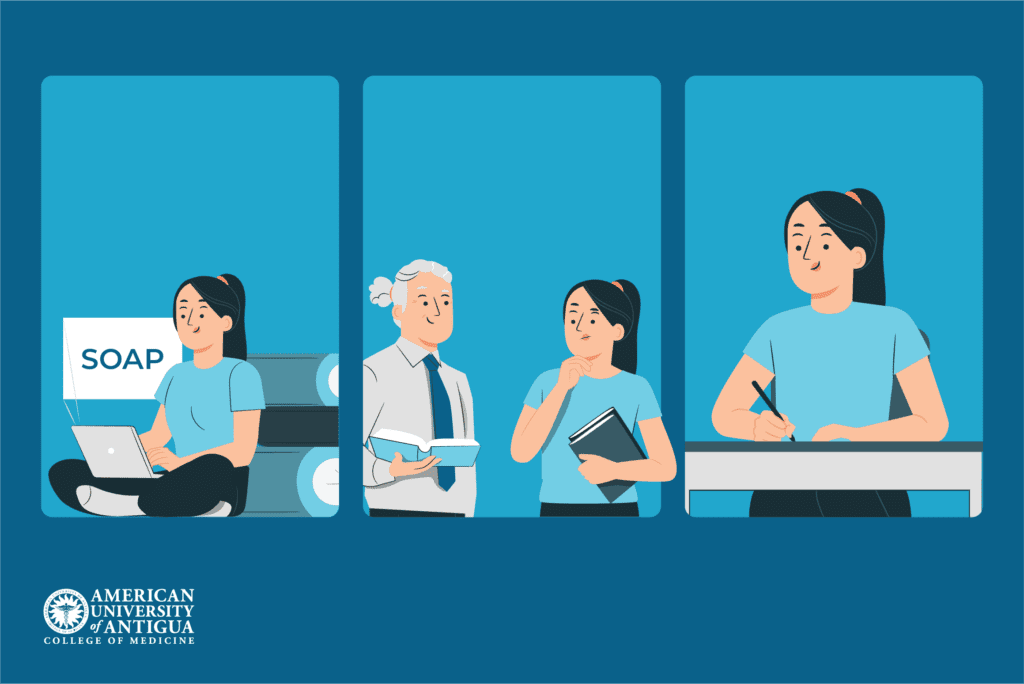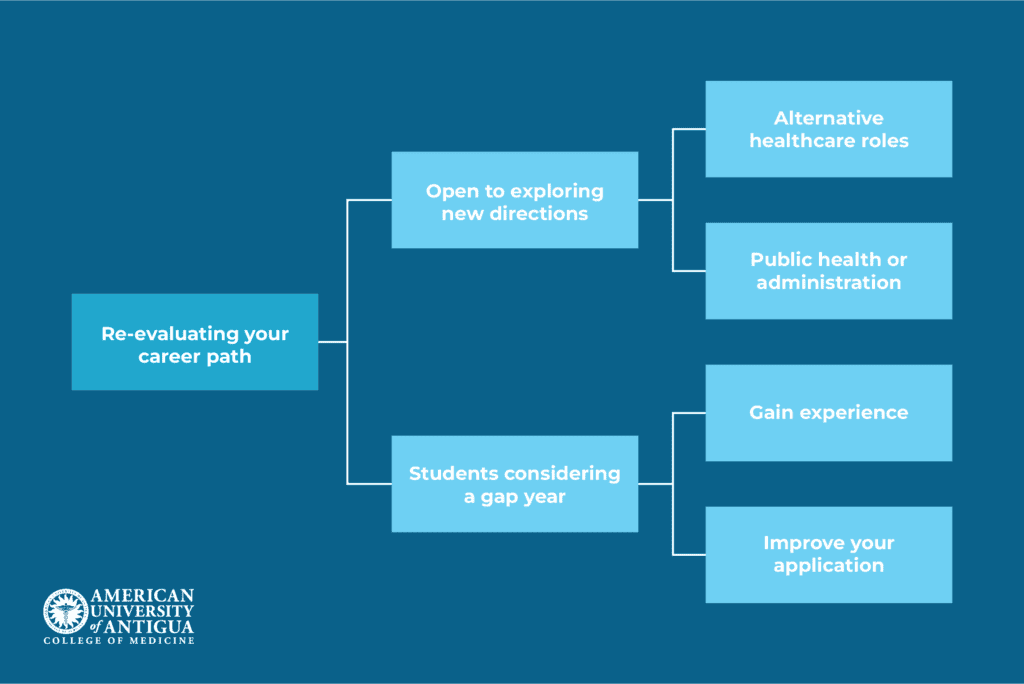What Happens If You Don’t Match Into Residency? Your Options
If you don’t match into residency, you can navigate this setback by improving your application, exploring alternative career paths, or utilizing programs like SOAP to secure unfilled positions while maintaining resilience and proactive efforts to advance in your medical career.
You didn’t match into a residency this time? You’re not alone. Around 10% of medical students in the U.S. typically don’t find a match, and that’s okay. What’s important is how you react.
✅ Request information on AUA's MD program TODAY!
YOUR PATH TO SUCCESS BEGINS HERE
With the right strategies and mindset, you can turn this situation into an opportunity for growth. Whether it’s improving your application, exploring alternative career paths, or reflecting on your goals, there are plenty of ways to stay on track toward a fulfilling healthcare career.
Keep reading to explore what happens if you don’t match into residency and steps to take as a future resident.
What Happens If You Don’t Match Into Residency?
When a medical student doesn’t match into a residency, it can initially feel like a significant setback. The immediate impact is often emotional, with students experiencing stress and self-doubt. From a resume perspective, not matching creates a gap that may raise questions from future residency programs or employers. This gap doesn’t have to be a permanent obstacle, but it does mean students must be proactive in addressing it.
Many students use this time to pursue additional certifications, research opportunities, or clinical experiences, which can enhance their resume in the long run. The key is to show growth, resilience, and commitment to improving their candidacy.
Academically, not matching doesn’t reflect a lack of capability or intelligence; rather, it may highlight areas for improvement such as choice of programs, interview performance, or insufficient clinical experience.
Medical students who don’t match often work to identify and address these weaknesses. They might pursue advanced degrees, such as an MPH or MBA, or take on roles like clinical research coordinators to strengthen their applications.
These activities can broaden their skill set and ultimately improve their outlook, not only for residency but for their future career in medicine.
Reacting immediately post-unmatch

Learning that you didn’t match into a residency in medicine can be disheartening, but how you respond in the days that follow can make all the difference. Taking immediate, constructive steps helps you stay focused and opens up alternative opportunities.
Here are some actions to consider:
- Participate in SOAP: The Supplemental Offer and Acceptance Program allows unmatched students to apply for unfilled residency positions. Research programs that align with your qualifications and submit tailored applications. This process is fast-paced but offers a second chance to secure a spot.
- Reach out for support: Talk to mentors, advisors, or faculty members who can provide guidance and emotional support. They can also help you review your application, identify areas for improvement, and strategize your next steps.
- Reflect and assess: Take time to evaluate why you didn’t match. Was it due to limited clinical experience, interview performance, or program choices? This reflection will help you develop a plan to strengthen your application.
Other options include pursuing research opportunities, clinical fellowships, or additional certifications to enhance your resume. Staying proactive and positive during this phase not only increases your chances of success in future cycles but also shows resilience—a key trait in medicine.
Improving your application
After not matching into a residency, your focus should be on improving your application for the next cycle and being competitive for residency. This process involves identifying weaknesses and taking specific actions to strengthen your candidacy. Here are some key steps:
Seek feedback
Connect with mentors, program directors, or advisors to review your application. Honest feedback can help pinpoint areas for improvement, whether it’s your personal statement, letters of recommendation, or interview performance.
Enhance clinical experience
Consider gaining more hands-on experience through observerships, externships, or volunteer work in your desired specialty. This demonstrates commitment and provides valuable insights into the field.
Pursue research opportunities
Getting involved in research projects, particularly in your target specialty, strengthens your resume. Publications or conference presentations showcase your academic interest and dedication.
Improve your academic credentials
If your scores were a limiting factor, retaking exams like Step 2 CK can show improvement. Earning certifications or additional qualifications (e.g., MPH, MBA) also adds value.
Refine your interview skills
Practice with mock interviews to improve communication and confidence. Highlighting growth and resilience during interviews can make a strong impression.
These steps not only strengthen your application but also show your determination to grow and succeed in the competitive field of medicine.
Re-evaluating Your Career Path

While being a resident and immersing in a clinical setting is an essential prerequisite for many medical roles, some don’t require it. Medicine is a diverse field, and there are many MD jobs without residency that you can take.
For those open to exploring new directions, here are some options to consider:
- Alternative healthcare roles: Many non-clinical positions, like medical writing, healthcare consulting, or health IT, benefit from your medical education. These roles allow you to stay connected to healthcare while using your skills in different ways.
- Public health or administration: Pursuing a Master of Public Health (MPH) or working in healthcare management can lead to impactful careers in community health, policy-making, or hospital administration.
For students considering a gap year, there are productive ways to use this time:
- Gain experience: Work as a clinical research coordinator or participate in global health initiatives. These experiences enhance your resume and provide valuable skills.
- Improve your application: Focus on boosting your academic credentials, gaining certifications, or publishing research.
Other options include teaching, working in medical education, or exploring entrepreneurial opportunities in healthcare. Choosing an alternative path doesn’t mean giving up—it’s about finding a fulfilling career that aligns with your goals and strengths best.
Coping with Emotional Impact
Not matching into a residency can feel like a personal failure, but it’s essential to remember that this doesn’t define your worth or future as a medical professional. The process is competitive, and many qualified candidates face this hurdle. Acknowledging the emotional toll is the first step to moving forward.
To stay resilient, focus on maintaining a growth mindset. Instead of dwelling on the setback, view it as an opportunity to learn and improve. Reflect on what didn’t go as planned, but also recognize the effort and achievements that brought you this far.
Here are some ways to cope and rebuild confidence:
- Lean on your support system: Talk to friends, family, or mentors who can provide encouragement and perspective.
- Practice self-care: Stay physically and mentally healthy through exercise, mindfulness, or hobbies you enjoy. Taking care of yourself helps you approach challenges with a clear mind.
- Set small goals: Breaking the next steps into manageable tasks can make the path forward less overwhelming and help you regain control.
Remember, resilience is about bouncing back and showing growth. This moment is just one chapter in your journey, not the whole story. Stay focused on your long-term goals and keep moving forward.
Conclusion
Facing a residency unmatch can be challenging, but it’s also an opportunity to reflect and grow. From reacting quickly through SOAP to improving your application with enhanced credentials or research, there are clear steps to take. Exploring alternative careers or taking a gap year can also lead to fulfilling paths.
Most importantly, carefully evaluate your application to identify areas for improvement. Seek feedback, build your experience, and follow the tips outlined above. Remember, this setback doesn’t define your future. With resilience and effort, you can find your way to a rewarding career in healthcare or beyond.
Frequently Asked Questions (FAQs):
Can you refuse a residency match?
Yes, but refusing a match can have consequences, such as being unable to participate in future residency cycles without special approval.
What is the easiest residency to match with?
Family medicine, internal medicine, and pediatrics are generally considered the easiest due to the higher numbers of available positions.
How common is it to not match into residency?
Less than 10% of U.S. MD graduates and a higher percentage of DO and international medical graduates (IMGs) don’t match each year.
✅ Request information on AUA's MD program TODAY!